2024 Summer Research Fellowships
Summer Research Fellowships provide summer support to doctoral students so they may focus exclusively on their dissertation research. The Summer Research Fellowship is intended to enable students to complete their degree more quickly and supports students who normally do not have funding during the summer. Thanks to many private donors, 29 graduate students are spending this summer focusing exclusively on their dissertation research. The students were selected for the quality of their work, their readiness to productively use the time this summer, and their mentors' willingness to work with them and provide guidance.
We’re pleased to present 29 Summer Research Fellowships for 2024 — and to share the honorees’ own descriptions of their research.
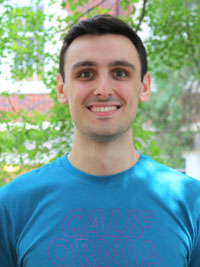
Jeffrey Ayers
Mathematics
“My research concerns investigating mathematical objects that arise from Theoretical Physics using techniques from algebra and geometry. A classic question in Quantum Field Theory asks whether we can predict a particle at starting point A will eventually arrive at some end point B. The answer is given as a probability function and has been known for some time as a partition function. The physicists who discovered this partition function knew from experimental evidence that their formula was correct, however it was not mathematically rigorous.
My research focuses on investigating certain types of partition functions and describing them in a rigorous way. In the language of mathematics this partition function can be described in the language of counting certain curves, and the specific enumerative geometric data is packaged into something called a vertex function. It has been conjectured that these vertex functions, which are expressed as an infinite series, are an expanded version of a rational function.
In my research, my advisor and I have developed and proven a formula for this vertex function in special branches of 3D N=4 Supersymmetric Gauge Theories called Nakajima Quiver Varieties confirming this conjecture in a special case. I hope to extend this formula into more general cases and allow mathematicians to get explicit descriptions of these objects.”
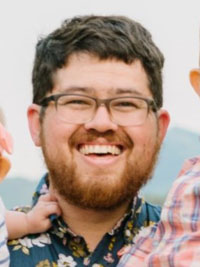
Ryan Baldwin
Classics
“My research specialty is Roman epic poetry and my dissertation focuses on one particular epic, Lucan's Bellum Civile (Civil War), written between 61 and 65 CE about depicts the civil war that took place between Julius Caesar and Pompey the Great (49-47 BCE). My research examines the violence that is omnipresent in Lucan's epic through a philosophical lens: the poet depicts the world afire, the Roman Republic toppled, the ripping apart of bodies, and the distortion of historical and cultural memory in and through civil war.
I propose to read this violence through the lens of Epicureanism, a Greek philosophical school based on the teachings of Epicurus (ca. 341-271 BCE), a religious skeptic, early promoter of atomic theory, and believer in scientific approaches to the cosmos. Lucan, I argue, uses the atomic language of Epicureanism to vividly describe the dissolution of bodies and memory in order to highlight the futility of civil war and the inevitable disintegration of the Roman world.
My approach challenges previous scholarship on Lucan that points to his familiarity with Stoicism, a rival school of thought adopted by his uncle Seneca. My dissertation brings together insights from philology, philosophy, historiography, and memory studies not only to demonstrate Lucan's grounding in the earlier work of Epicurean writers, but also to emphasize the fragile nature of bodies and the destructive power of civil war: everything is soluble and changeable as the cosmos decays, political and physical bodies disintegrate, and memory erodes.”
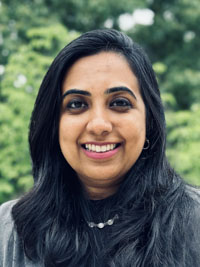
Dharini Bathia
Public Policy
“I am working on a three-chapter dissertation. The overarching theme of my dissertation is to study the impact of social protection programs like cash transfers on various outcomes among individuals in low-income country setting.
In the first chapter, I am examining the impact of cash transfers on non-cognitive skills among youth and whether there is a differential impact based on gender.
In the second chapter, I examine the impact of social safety nets on gender norms and attitudes. This chapter is a systematic review. The main aim is to assess whether 'gender transformative' programs address women's (and men's) gendered needs and transform derogatory practices into ones that are more gender equal.
Finally, in the third chapter, I use the Family Stress Model framework to examine whether parental stress in low-income households is associated with depression among youth and whether this impact is moderated by receipt of cash transfers.
For chapter one, I use data collected low-income youth in Malawi. For the second chapter I will draw on quantitative experimental and quasi-experimental evidence in low-and middle-income countries from various bibliographic sources like Scopus and PubMed. For chapter three, I am using caregiver and youth data from three waves from low-income households in Malawi.”

Ling Beisecker
Human Movement Science
“The prevalence of depression, anxiety, and stress has increased two-fold since 2013 among 18-24 year old women in college, hereafter referred to as college women. Decades of research demonstrate that participating in physical activity can mitigate these mental health challenges. However, during the first six months of college, physical activity decreases significantly among college women. Once college women decrease their levels of physical activity, this downward trend persists over the course of their lives. Women who are less physically active, and experience greater challenges with mental health compared to their peers, have a shorter life span and poorer overall quality of life.
To date there has not been a comprehensive review on the impact of physical activity on adverse mental health outcomes among college women. This gap limits our knowledge on understanding key determinants in the relationship between physical activity and mental health in college women. Identifying methods for maintaining or increasing physical activity in college women is imperative for improving overall physical and mental health outcomes across their lifespan.
I will be conducting a systematic review and meta-analysis to determine the impact of physical activity on depression, anxiety, and stress among college women. The primary objective of this study is to gain a comprehensive understanding of the relationship between physical activity and mental health among college women with the ultimate aim of creating early access interventions in college that promote lifelong physical activity and mental health for women.”
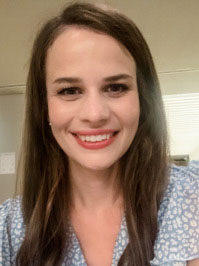
Amanda Brown Marusiak
Epidemiology
“My research in infectious disease epidemiology focuses on the prevention and control of Covid-19 and other respiratory illnesses, specifically in the healthcare setting. Controlling the spread of infectious illness within healthcare is important not only for the wellbeing of healthcare personnel and patients, but for continuity of quality healthcare services available to communities.
In the context of Covid-19, two major infection prevention and control strategies have included contact tracing and reducing presenteeism (working while ill) among healthcare personnel. Both topics are under-studied in scientific literature relative to their widespread use. My work aims to better understand these strategies through two projects leveraging data collected from healthcare personnel in North Carolina during the Covid-19 pandemic.
The first project asks the question: does contact tracing healthcare personnel work for Covid-19, and under what circumstances is it most useful? Using contact tracing program data, we will quantify Covid-19 exposure and transmission risks among healthcare personnel. The second project on presenteeism asks the question: how often did healthcare personnel come to work sick during the pandemic, and why? From survey data, we will characterize how and why presenteeism occurred during multiple waves of Covid-19.
Insights gained from this research will improve healthcare working environments and patient safety. Our findings will also extend to other important infectious pathogens that threaten healthcare personnel and patients, including future epidemics.”
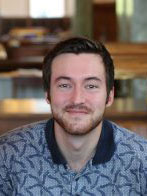
Brendan Chambers
English and Comparative Literature
“In the wake of World War II, spurred in part by the clandestine ferocity of the early Cold War, the US produced and deployed a number of powerful new surveillance technologies. From audio “bugs” to LSD, these inventions promised unprecedented access to private spaces like the office, the bedroom, and perhaps even the mind.
My dissertations asks: how do novels in this period change in response to the proliferation of these technologies? The novel is perhaps the premier literary form for the representation of private life. It is distinguished by sustained attention to its characters, related by a narrator who can report their most intimate thoughts and actions. By the 1960s, new surveillance technologies had given government agents and police officers the kinds of access previously exclusive to authors' imaginations. Consequently, novelists came to view their narrative techniques as ethically charged, and their novels as laboratories for observing and responding to this new state of affairs.
For some authors, like Thomas Pynchon, the novel offers a chance to imagine and accommodate his readership to a world without privacy. For others, like John Updike, the opposite is true, as he searches for boundaries that would reestablish a now anachronistically firm distinction between the private and the public. For still others, like Sylvia Plath and Toni Morrison, the novel serves as a space for exploring the ways that gender and race have always shaped access to privacy. And all of this literary experimentation takes place in complex relation to the equally tumultuous legal history of privacy unfolding simultaneously.”
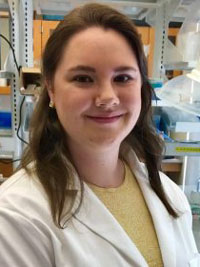
Melanie Cohn
Earth and Marine Sciences
“In a single liter of seawater there are trillions of viruses, billions of bacteria, millions of phytoplankton, and zooplankton that form the base of ocean food webs. These microscopic organisms are responsible for regulating elemental cycling at the global scale. However, the driving microbial processes that regulate their flux are difficult to elucidate. I explore (1) how microbial communities are structured and (2) the impact of microbial metabolism on biogeochemical cycles.
I sampled North Carolina's Neuse River Estuary across various seasons and environmental conditions, including after Hurricane Ida and during a drought. In the lab, I incubated the water under light treatments to drive changes in the community and water chemistry. I tracked changes in the relative abundance of the microbial populations, identified shifts in their metabolic function using RNA sequencing, and correlated that with changes in water chemistry.
For example, when exposed to daylight conditions, the phytoplankton community is supported, generating organic matter as they metabolize. Under UV light, the phytoplankton rapidly decline, there's an increase in toxin-producing cyanobacteria, and the UV radiation degrades compounds that are otherwise difficult to transform.
This work progresses our understanding of how microbial communities form in the environment, drawing connections to realized environmental impacts. It specifically addresses the drivers of carbon cycling that generates biomass in food webs, is respired as carbon dioxide, or can be exported to the coastal ocean. Scaled up to larger ocean ecosystems, this has notable impacts for global-scale carbon cycling under changing climate.”
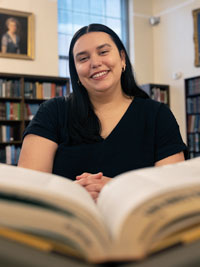
Annie Elledge
Geography
“My dissertation research analyzes the relationship between fat embodiment, place-making, and desire within weight-inclusive wellness spaces in the Research Triangle of North Carolina. Building on my MA thesis, a history of Durham, North Carolina as the “Diet Capital of the World,” the project considers the development of a weight-inclusive wellness network in an area previously designated as a dieting capital.
Current geographic work on fatness falls into one of two categories: work on “obesogenic environments” (places that create "obesity") or structural fatphobia. These interventions leave little room to imagine ways for fat people to live joyful and pleasurable lives. Drawing on feminist geography, fat studies, critical geographies of fatness, critical disability studies, Black studies, and urban geography, I examine the development of fitness spaces that are more humane, compassionate, and accessible for fat people.
Through a multi-method qualitative study, I will conduct interviews with stakeholders of the Research Triangle's weight-inclusive network, participant observation at fitness studios, and body mapping sessions with fitness clients. Notably, the project develops an innovative body mapping methodology combining feminist qualitative emotional mapping with body mapping, which I will use to analyze fat people's experiences in spaces from the fitness studio to the home to the city. The results of the project will include new theories and methodological approaches for studying embodiment, anti-fatness, fitness spaces, and belonging.”
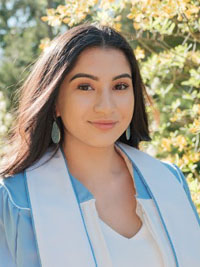
Sandra Garcia
Nursing
“Despite federally mandated protections, pesticide exposure remains an occupational hazard posing significant risks to immigrant Latinx farmworkers' health and safety. Latinx farmworkers provide over half the direct hand labor in agriculture in the United States (U.S.). Latinx farmworkers experience numerous short and long-term side effects attributed to pesticide exposure such as various skin conditions, infertility and cancer. Thus, insight into facilitators of pesticide protective behaviors may inform future interventions to reduce both short- and long-term health effects of pesticide exposure in Latinx farmworkers.
My research will use a community-based participatory research (CBPR) approach to examine facilitators that promote pesticide protective behaviors identified by Latinx farmworkers and growers. To complete this, I will conduct semi-structured interviews with Latinx farmworkers and growers to identify facilitators of pesticide protective behaviors among farmworkers. Findings from the interviews will be presented to growers and Latinx farmworkers using visualizations and personal interactions, such as forums.
I will also plan and implement a CPBR dissemination technique—empowerment forums—to facilitate the development of future interventions based on the needs of growers' and Latinx farmworkers reflected in the interview question findings. An empowerment forum will promote group discussion between growers and Latinx farmworkers about the next steps based on findings and has the potential to create immediate positive change in farms.”

Anjerul Islam
Environmental Sciences and Engineering
“The Rohingyas are a marginalized ethnic group from Myanmar who were denied citizenship and forced to flee to neighboring Bangladesh due to extreme violence. According to UNHCR, around 960,000 Rohingya refugees reside in densely populated camps in Cox's Bazar, Bangladesh. The camps lack adequate water and sewage infrastructure, leading to the spread of food, waterborne and airborne diseases.
Previous studies reported the presence of enteric microbes near Fecal sludge treatment plants (FSTPs) at ambient conditions, but no evidence was found in humanitarian contexts. Bioaerosols originated from FSTPs can travel and may contaminate uncovered food and fomite surfaces. When inhaled or ingested, these enteric bioaerosol can cause diseases like diarrhea, cholera, and typhoid fever.
To address the risk posed by bioaerosols, I will gather evidence by collecting bioaerosols samples proximity to five selected FSTPs in Rohingya camps. My main objectives are: 1. to detect and quantify enteric pathogen-gene targets in bioaerosols from proximity to fecal sludge treatment plants, 2. to validate the viability of fecal indicator bacteria (E. coli) as a proxy for enteric pathogens at the point of sampling using culture-based methods, 3. to compare and contrast of infectious pathogen viability and persistence among different fecal sludge treatment plants, 4. to assess the environmental conditions (temperature, relative humidity, wind speed) on pathogen survival.
This evidence will guide policy decisions regarding specific measures to control bioaerosol transmission, ultimately leading to a reduction in diarrheal diseases in refugee settings.”

Aniyar Izguttinov
Health Policy and Management
“On July 1, 2021, North Carolina transformed its Medicaid program by launching comprehensive managed care plans that now collectively cover most of the state's Medicaid population. As part of the transformation, the reimbursement structure shifted from a fee-for-service to a value-based payment system that rewards providers for the quality rather than the quantity of services. Fee-for-service payment structures incentivize low-value care, defined as “the use of health services for which the harms or costs outweigh the benefits”.
Prior studies indicate that 6-8% of healthcare spending in the U.S. (approximately $344 billion annually) could be due to low-value care. Apart from financial consequences, unnecessary procedures such as vitamin D testing and imaging for low back pain may result in both direct harm to patients (e.g., hospital-acquired infections) and indirect negative outcomes (e.g., heightened anxiety among patients).
In theory, the transition to value-based payment approaches should have a counter-effect and reduce low-value-care use. However, the current evidence from other states and interventions is inconclusive. Therefore, it remains ambiguous whether the value-based payment reform in North Carolina will have an effect on low-value care utilization and warrants empirical investigation.
The overarching goal of my project is to further our understanding of the impact of value-based payments on low-value care trends and to contribute towards accelerated de-implementation of such services from healthcare systems.”
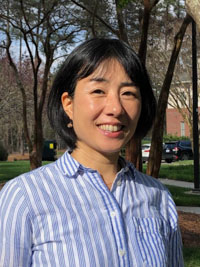
Sayoko Kawabata
Occupational Science
“My study is a collaborative study with residents living in a historically Black neighborhood in North Carolina. The study aims to describe and explore how play for children and youth in this neighborhood is shaped through socio-historical factors and contributes to community cohesion.
Play is a central occupation in children's lives and a fundamental human right. However, children living in communities of color face disparities in access to opportunities and spaces for play due to the history of segregation and racism. Play is also a form of children's participation in the community as outdoor play in the neighborhood is known to enhance community ties.
The neighborhood where my study takes place has become a multi-cultural community with an influx of immigrant families in affordable housing. The current majority population consists of Black Americans and families of Mexican descent. A community watch group, who is my research partner, has supported the growth of this neighborhood through advocacy efforts and hosting community events.
With the initiation of the project, I held meetings with a research steering committee composed of adults and youth in the neighborhood to create a research question and discuss methods that align with community interests. A group of middle school-aged youth was formed through this process to take part in the data collection and analysis, representing their own experiences and perceptions.
My study will critically examine the communal experiences of play in this neighborhood and explore its complexity constructed through their socio-historical and geographical context.”
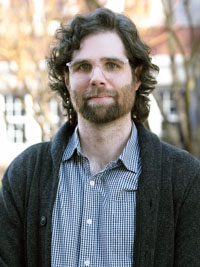
Eric Kirk
Education
“I am interested in the ways science education can empower people to address complex social problems like environmental justice, food crises, renewable energy, public health issues, and responsible uses for biotechnology. These issues are often the focus of science education, however understanding science does not fully prepare students to engage with these problems beyond the classroom.
Students must learn to use science to guide their participation in a democratic society. This means not only understanding scientific content, but also the complex societal systems (e.g., economic systems, systems which perpetuate inequities) so that they may apply science in ways that account for the diversity and complexity of modern society. This has led to work focused on how learners understand and represent complex systems, use models to understand social issues, understand perspectives of people they disagree with, and seek new information about issues as they unfold.
For my dissertation, I am studying how learners use simple, hand drawn models to navigate societal challenges. Specifically, I am investigating how models can help learners develop more robust understandings of these issues, how learners come to understand models as tools for enriching their knowledge and solving problems, and how the act of constructing models with others can influence aspects of decision-making as it relates to these issues.”

Elizabeth Kwong
Biomedical and Health Informatics
“Elizabeth's research focuses on improving patient safety and quality of care through the application of human factors engineering principles and health technology tools. Specifically, she is developing and implementing automated quality checklists and electronic patient reported outcomes to enhance the efficiency and effectiveness of healthcare processes.
Her dissertation work centers on the design, evaluation, and implementation of an automated physics pre-treatment quality checklist within the field of radiation oncology. By involving stakeholders at different levels, Elizabeth aims to create a comprehensive, automated checklist that not only ensures patient safety but also enhances usability and reduces cognitive workload for healthcare professionals. Through rigorous evaluation, she seeks to assess the impact of this tool on various outcomes, including patient safety, usability, cognitive workload, and implementation outcomes.
Elizabeth's research bridges the gap between technology, human factors engineering, and healthcare practice, ultimately striving to improve the quality and safety of patient care delivery.”

Nayeon Lee
Nursing
“The U.S. healthcare system is confronting a significant nursing shortage, with about 100,000 registered nurses (RNs) leaving their positions during the COVID-19 pandemic and an anticipated 600,000 more planning exits by 2027.1 To mitigate this, the recruitment of internationally educated nurses (IENs) has intensified. Currently, around 197,000 IENs are employed in the U.S., playing a critical role beyond merely filling vacancies.
IENs face numerous challenges upon their transition to the U.S., including cultural and linguistic barriers, and differences in nursing practices. These issues may impact their workplace well-being and lead to outcomes such as burnout, job satisfaction, and intention to leave. Despite this, there is limited research comparing the experiences of IENs with those of U.S.-educated nurses and how these experiences affect IENs' work-related well-being.
This dissertation aims to bridge this research gap by analyzing the relationship between individual characteristics, work conditions, and workplace outcomes among IENs versus U.S.-educated nurses. Utilizing data from the 2022 California Board of Registered Nursing Survey, this study will:
1. Conduct a scoping review of empirical, peer-reviewed studies of IENs and describe IEN-reported wellness and workplace satisfaction, and the individual- and workplace-related factors that contribute to IEN-reported wellness and workplace satisfaction.
2. Perform a retrospective cohort study to identify differences between IENs and U.S.-educated nurses in terms of personal and professional factors, and their impact on job satisfaction, intention to leave, and burnout.
3. Examine the relationship between workplace outcomes and the influencing personal and professional characteristics among IENs.
This research is pivotal for understanding and improving the integration and retention of IENs in the U.S. healthcare workforce.”

Claudia Lombardo
Romance Studies
“My research examines Sicilian energy narratives spanning from the 1950s to the present ecological transition. Through a diverse archive encompassing literary works, art, and historical documents, it investigates the evolution of energy modernization and its impact on Sicilian landscapes. Grounded in the environmental humanities framework, the study explores how Sicily's landscapes have been energized both metaphorically and materially in response to global environmental challenges such as the energy crisis and issues of environmental justice.
By merging Italian studies with Energy Humanities, the research analyzes Sicilian authors' portrayals of sacrificed landscapes juxtaposed with the idealized progress of the high-tech economy. It highlights ecological conflicts often overlooked in Italy's energy strategy, offering a fresh perspective to comprehend and mitigate the effects of an energy culture thriving on sacrificed peripheries.
The research's relevance is emphasized by Sicily's emerging role as an international energy hub, necessitating a deeper understanding of energy cultural dynamics in the region and their implications on a broader scale. It also prompts critical dialogue with the United States due to its significant military and institutional energy presence on the island.”

Adia Louden
Maternal and Child Health
“Generations of discrimination and disinvestment have fueled a national crisis of violence, disproportionately affecting marginalized communities, particularly Black youth who experience high rates of gun homicides and community violence (CV). The firearm homicide rate (per 100,000 persons) for Black Americans was 27.5 in 2022, far surpassing other racial groups.
While researchers are exploring neighborhood risk factors contributing to these disparities, the impact of childhood neighborhood safety perceptions on future CV experiences remains understudied, lacking in lived experiences and rigorous methodologies. This dissertation seeks to fill this gap by illuminating the importance of race and place, and focus on the US South, a region marked by profound differences in history, culture, gun laws/access, and the dynamics of rural/urban spaces.
Through a longitudinal, mixed-method approach, Study 1 analyzes national data to understand how childhood perceptions shape CV experiences during young adulthood, considering race as a modifier. Study 2 involves qualitative interviews with Black young adults in the US South to delve into CV experiences, safety definitions, and perceptions of structural racism's role in their encounters with violence.
This intersectional analysis aims to amplify nuanced understandings of CV, avoiding the erasure of multiple identities. The combined findings advocate for reinvesting in Black communities to address systemic inequalities perpetuating violence. This work contributes to understanding childhood safety influences, the link between social and economic investment and CV, and proposes targeted interventions for community well-being and violence prevention.”
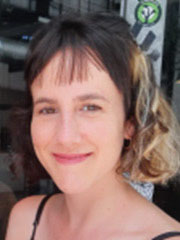
Maria Inés Martinez Echague
Sociology
“My dissertation examines ~60 in-depth interviews with women, non-binary and trans individuals in Uruguay, one of the first and most active sites of the “Feminist Tide” in Latin America. This movement may not have received much attention in North America, but across South and Central America the details are well-known: a decade of massive protest, media debate, policy change, and cultural transformation so sudden that some observers refer to it not just as a “tide” but as a “tsunami.” This movement challenges sexist cultural norms around gender and sexual violence, household labor, and reproductive rights.
I analyze how the “Feminist Tide” has impacted the values, ideals, and behaviors of the women, non-binary and trans individuals that it seeks to empower — including their actions to address the inequalities that they face daily. My positionality as a Uruguayan feminist woman increases my ability to understand my interviewees and the context in which they are living.
Overall, my dissertation has the potential to offer important understandings into how social movements shape social change through day-to-day experiences and understandings, an analysis that may inform other struggles for social justice on the ground around the world.”
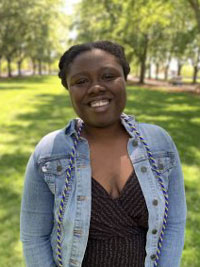
Destiny Meadows
Musicology
“From the 1920s until the 1950s, fitness in the United States was societally considered an interior and specialized fad. However, by the 1960s and well into the 1980s, it became a marker of morality and self-improvement. These tenets, which extended beyond the realms of fitness and wellness, were heavily privileged and promoted by the US government—and later society-at-large—who after World War II and into the tense years of the Cold War longed for a country-wide moral rhetoric. I hypothesize that this longing led the way toward a national fitness imaginary; one that traveled sonically through mass media produced during the 1970s and 1980s.
Scholarship on exercise history often assumes that physical fitness was an abrupt capitalist phenomenon of the late twentieth century rather than a top-down, gradual implementation of capitalist ideology across US physical fitness arenas. Through sound and music, my project develops an ideological theory of US-American fitness from government-sponsored, propaganda-fostered investment in capitalist subjects to private sector, neoliberal, free-market bodies on cassette and VHS tape.
My dissertation examines the relationship between sound and image in creating an “ideal” US American body during the Cold War through popular media of the period. Mainly, I ask: how did the mass mediation of exercise help construct US American ideals of identity and selfhood amid US-Soviet, capitalist-communist sociopolitical conflict?”

Carrington Merritt
Psychology and Neuroscience
“My research uses social neuroscience and psychoneuroimmunology (PNI) approaches to explore immunological and neural pathways linking discrimination and other racism-related stressor and health among Black Americans. I will be completing an integrated dissertation, comprising of three independent empirical papers.
Specifically, the first paper is a cross-sectional, correlational study examining increased systemic inflammation as a mechanism linking discrimination and cardiovascular health conditions among a sample of middle-aged Black Americans, and whether greater perceptions of control serve as a protective factor in this relationship.
The second paper explores the causal relationship between an experimentally manipulated experience of discrimination and immune reactivity (i.e., inflammation) within a sample of young Black adults. Together, these first two studies will importantly expand knowledge on immunological processes that may mediate the relationship between experiences discrimination and poorer health among Black Americans.
Finally, my third paper is a functional neuroimaging (fMRI) study exploring how past experiences of discrimination may differentially shape Black individuals' brain activity in response to cross-race social evaluation. The exploration of the neural mechanisms involved in this kind of cross-race social evaluation and their association with prior experiences of discrimination may shed light on “top-down” processing involved in linking discrimination and health.
Altogether, this collection of studies will provide novel insights into immunological and neural pathways that may be implicated in how racism “gets under the skin” to impact health.”
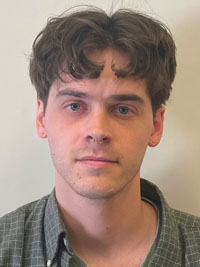
Conner Schultz
Philosophy
“I work predominantly in epistemology, the branch of philosophy dealing with questions like “what is knowledge” and “how is knowledge possible”. Within epistemology, I aim to address the pervasive challenge of cognitive limitations in our pursuit of knowledge. My research explores how biases, echo chambers, fake news, and motivated reasoning hinder our ability to discern truth from falsehood. Indeed, I suspect that these factors genuinely threaten our capacity to acquire knowledge.
For example, if one can't tell whether they are in an echo chamber, then do they really know whether COVID vaccines are more effective than natural immunity, whether the 2020 election was stolen, or whether the Capitol riot on January 6th was an insurrection? However, the pervasiveness of things like echo chambers, fake news, and cognitive biases should not cause us to resign in defeat. Instead, we as individual inquirers need to figure out how to navigate these challenges, lest we succumb to complete skepticism.
My current dissertation chapter rises to this skeptical challenge by developing a defense of what I term “epistemic insurance policies”: norms of inquiry that safeguard against cognitive pitfalls, albeit with potential marginal costs. These policies consist of strategies and heuristics offering practical guidance for navigating complex informational landscapes.”
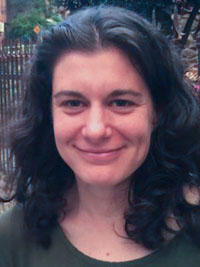
Diane Slocum
Anthropology
“This project explores the contradiction between colonial mission sites as both controlling forces and celebratory spaces through an investigation of the relationship between residents and their mission church in Tahcabo, Yucatán, Mexico. The 16th-century Spanish arrival in Yucatán brought political, economic, and social changes to Maya societies, which were enacted through the creation of pueblos centered around gridded streets and mission churches. While traditionally seen as tools of oppression, today these settlements serve as sites of identity and historical remembrance for Yucatecans.
This project centers on the theme of mobility as a mechanism of persistence to understand ties that people maintained to their pueblo despite socio-political disruptions particularly since the 19th century.
Through a collaborative archaeological framework, this study integrates architectural analysis, spatial landscape data, oral histories, and ethnography to identify 1) how changes in the built environment at mission sites reflect and shape local histories and 2) how residents of historical mission sites in Yucatán experience the multi-temporal built environment in which they live.”
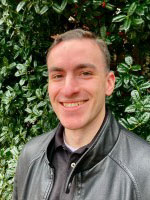
David Stilwell
Physics and Astronomy
“My research explores the physiochemical hydrodynamics of 3D printing with novel materials for high-performance applications. I am using a technique called selective laser sintering (SLS) to study the characteristics of printing with a new class of amorphous reactive oligomers produced by collaborators in the Department of Applied Physical Sciences.
The SLS technique prints objects by “selectively” melting regions in a layer of polymer powder using an infrared laser. Our reactive oligomers have lower molecular weight and, therefore, lower viscosity than their commercial counterparts, improving mobility and densification. They are also “reactive” meaning the individual molecular chains contain end-groups that thermally activate to improve structural integrity.
The goal of my work is to use fluorescence spectroscopy and light scattering techniques to study the hydrodynamics of the material as it melts and resolidifies during the rapid process of laser heating. Within the signals produced by a separate beam of ultraviolet light interacting with the oligomers, I can extract information about powder coalescence as it fuses and forms a solid object.
Much of the current body of work does not study in-situ interactions, but only aims to connect print conditions (like laser power and temperature) to final part mechanical properties. My hope is that this investigation will provide much needed insight into how the materials respond to laser heating and unlock access to 3D printing with this new class of material for extreme and demanding applications.”
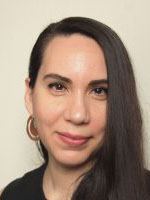
Marissa Velarde
Maternal and Child Health
“The primary objective of my doctoral dissertation is to measure and understand the effect of recent historical events on timely access to abortion, with a focus on the US South, abortion fund users, and Latinas. To this end, I am employing both quantitative and qualitative methods to achieve three aims.
For Aim 1, I am evaluating the effect of COVID-19 on abortion access and timing among people obtaining their abortions in North Carolina and assess whether there was a differential impact between Latinas and White women. Using data from the North Carolina Department of Health and Human Services for abortions performed in the state, I am employing an interrupted time series analysis to compare two outcomes before and after the pandemic.
Aim 2 assesses the impact of the Dobbs decision on the promptness of obtaining an abortion among clients of an abortion fund by conducting a survival analysis of their administrative data.
Aim 3 is a qualitative study that seeks to describe the lived experience of obtaining an abortion post-Dobbs among at least 20 abortion fund clients who live in the US South. I am conducting semi-structured interviews in English and Spanish to understand the experiences and challenges of navigating the current abortion landscape.
This dissertation will fill a gap in the literature regarding abortion access among Latinas and people who use abortion funds and will have important implications for abortion access equity.”

Lingyu Wang
Information and Library Science
“How do people take care of archives and their records, beyond what patrons see, what policies and guidelines describe, and what people in and outside archives habitually give intellectual credits to? What are the social relations, technological histories, and intellectual genealogies behind these practices? And, how do these practices shape the more abstract structures, meanings, and politics of archives from the ground up?
In this creative, interdisciplinary research, I critically examine archives' housing practices (storing and protecting archived materials) as the most fundamental yet so often marginalized aspect of archives. My research studies their histories and ecologies, drawing broadly from critical theories, media histories, ethics of care, institutional policies, archival science, and my own professional works in libraries and archives.
Here, I aim to bridge two crucial gaps: the understudied ground-level archival practices and archives' marginalized caregivers. I will foreground and study the works happening in archives every day, and re-establish their social significance and intellectual histories. At the end of my research, I aim to deliver both a dissertation and a website to reflect the complex networks around my research and the very archival works I'm studying.”

Meredith Wang
Health Behavior
“Adolescents are at higher risk of infecting HIV and have low rates of treatment adherence and viral suppression (a desired state for people living with HIV). Concurrently, there is high prevalence of depression and other major mental health disorders in adolescents living with HIV, which were also linked with reduced treatment adherence.
Social support, guardian support and communication has been found to increase treatment adherence for adolescents and interventions to target that route is being developed and evaluated right now.”
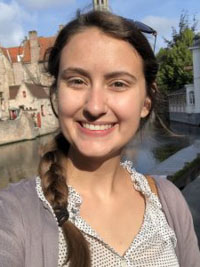
Hannah Williams
Art History
“My dissertation, titled “Miraculous Microcosms: Affective Piety and the Significance of Scale in European Devotional Micro-Sculpture, c.1400-1550,” demonstrates that around the time of the Renaissance, there was a fashion for owning remarkably miniaturized devotional sculpture like never before. Complex devotional sculptures that are so small they could fit in the palm abound.
I am interested in what small scale accomplishes for the late medieval devotee specifically, taking into account contemporary beliefs regarding the holiness of certain materials, the perceived relationship between the body and the emotions, and the centrality of the senses in the facilitation of a robust devotional experience. The full gamut of sensory input offered by a devotional miniature—not just its appearance—is central here.
My approach is cross-disciplinary, and I incorporate modern affect theory and cognitive theory to gain a fuller picture of an experience that, I argue, must have been sought after and attainable by large swaths of the late medieval European population: male and female, lay and clerical, rich and poor. I seek to answer the question as to why patrons and artists went to such an extent to create such small sculptures that seem to defy other aesthetic standards for art in the period.”

Emily Youree
English and Comparative Literature
“My project expands the definition of medieval and early modern outlaw literature to include not just the outlaw romances and plays of Robin Hood, but also medieval alliterative poetry such as William Langland's Piers Plowman (c. 1370–1390), and early modern political fiction such as Thomas More's Utopia (1516). These texts contain, I argue, an “outlaw discourse”: a throughline of political theory in which those who exist outside the law are the most qualified to advise or take action against legal authorities.
My dissertation demonstrates that late medieval texts in this tradition bound outlawry to kingship and claimed that the king and the outlaw shared an equal claim to sovereign power outside the law. In the early modern period, however, outlaw literature such as Anthony Munday's two Robin Hood plays (The Downfall of Robert, Earle of Huntington, and The Death of Robert, Earle of Huntington, first staged in 1599) and More's Utopia began to imagine a divide between outlaws and centralized authority, pitting Robin Hood against Prince John and the Utopian Zealot against his authoritarian government.
Viewing late medieval and early modern texts through a lens of outlaw discourse redefines our interpretations of them, revealing complex frameworks of jurisdiction, sovereignty, legality, and ideal governance that contradict the conventional political theories of the time.”
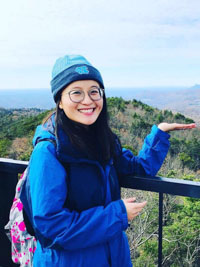
Linyu Yu
Education
“Academic help-seeking (AHS) is an important self-regulated learning strategy for college students. However, academic help-seeking has been studied in stratified fashion that isolates research from different contexts. It has also been measured predominantly through self-reports based on perceived needs, or narrowly based on interactions with help resources in technology-enhanced environments.
In this dissertation, I integrate social and cognitive theories of help-seeking to explore the dynamics of AHS engagement, delineating the nuances of AHS events in terms of time scale, target, effort cost, and psychological cost. This circumplex model is intended to bridge AHS research in technology-based, classroom, and campus settings.
Using this conceptual model, I examine college students' AHS patterns in an introductory biology class, leveraging behavioral data from 488 students. This data encompasses their interactions on online homework platforms, discussion boards, office hours, and academic success centers.
The empirical study pursues two primary research objectives: 1) comprehending the overall frequency, trend, and pattern of college students' help-seeking activities; and 2) exploring the relationships among antecedent characteristics (e.g., motivation), academic help-seeking behaviors, and learning performance. To achieve these objectives, I will employ data visualization, latent profile analyses, and regression analyses. The empirical study serves to test assumptions regarding help-seeking behaviors in the circumplex model.”
